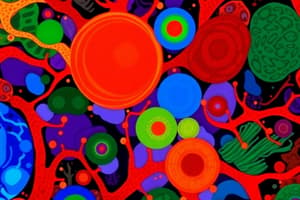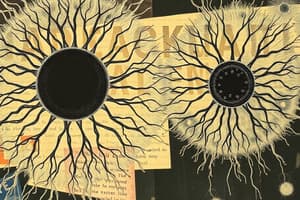Podcast
Questions and Answers
What is the fundamental unit of an organism?
What is the fundamental unit of an organism?
- System
- Tissue
- Cell (correct)
- Organ
What is the primary function of energy in cells?
What is the primary function of energy in cells?
- To synthesize nutrients
- To maintain internal order
- To catalyze chemical reactions (correct)
- To regulate homeostasis
What is the term that describes all the chemical reactions that occur in a cell?
What is the term that describes all the chemical reactions that occur in a cell?
- Metabolism (correct)
- Respiration
- Photosynthesis
- Fermentation
What is the ultimate source of energy for nearly all life on the planet?
What is the ultimate source of energy for nearly all life on the planet?
What is a characteristic of life that involves the ability to maintain a stable internal environment?
What is a characteristic of life that involves the ability to maintain a stable internal environment?
What is an example of a discovery that led to the development of a cancer treatment?
What is an example of a discovery that led to the development of a cancer treatment?
What is the primary basis for grouping species in taxonomy?
What is the primary basis for grouping species in taxonomy?
Which domain includes organisms that can be unicellular to multicellular and eukaryotic?
Which domain includes organisms that can be unicellular to multicellular and eukaryotic?
What is the term for the complete genetic makeup of an organism?
What is the term for the complete genetic makeup of an organism?
What is the order of classification from most inclusive to least inclusive?
What is the order of classification from most inclusive to least inclusive?
What is the purpose of binomial nomenclature?
What is the purpose of binomial nomenclature?
What is the characteristic that distinguishes prokaryotic cells from eukaryotic cells?
What is the characteristic that distinguishes prokaryotic cells from eukaryotic cells?
What is a characteristic of a useful hypothesis?
What is a characteristic of a useful hypothesis?
What is the main difference between a hypothesis and a theory?
What is the main difference between a hypothesis and a theory?
What is an example of a prediction that can be made from the theory of DNA as genetic material?
What is an example of a prediction that can be made from the theory of DNA as genetic material?
What is a characteristic of a theory?
What is a characteristic of a theory?
Why can a theory never be proved true?
Why can a theory never be proved true?
What is an example of evidence that supports the theory of DNA as genetic material?
What is an example of evidence that supports the theory of DNA as genetic material?
What is the smallest unit of biological organization that biologists consider alive?
What is the smallest unit of biological organization that biologists consider alive?
What is the primary function of nerve tissue?
What is the primary function of nerve tissue?
What is formed when many molecules bond together to form a polymer?
What is formed when many molecules bond together to form a polymer?
What is the characteristic that distinguishes true cells from other cellular structures?
What is the characteristic that distinguishes true cells from other cellular structures?
What is the level of organization that consists of a group of similar cells that associate with each other to carry out a specific set of functions?
What is the level of organization that consists of a group of similar cells that associate with each other to carry out a specific set of functions?
What is an example of an organ that consists of several types of tissues?
What is an example of an organ that consists of several types of tissues?
What is the primary function of the genome?
What is the primary function of the genome?
What is the term used to describe the complete complement of proteins that a cell or organism can make?
What is the term used to describe the complete complement of proteins that a cell or organism can make?
What is the scientific method used for?
What is the scientific method used for?
What is a hypothesis?
What is a hypothesis?
What is the relationship between the genome and the proteome?
What is the relationship between the genome and the proteome?
What is the purpose of different branches of biology?
What is the purpose of different branches of biology?
Flashcards are hidden until you start studying
Study Notes
Biology: The Study of Life
- Biology is the study of life, leading to unforeseen discoveries, e.g., Pacific yew tree and cancer treatment, Crystal Jellyfish and GFP discovery, Arrowhead Viper and inhibitors of high blood pressure, Streptomyces griseus soil bacteria and streptomycin, and White willow tree and aspirin.
Characteristics of Life
- Cells and organization: the simplest unit of an organism is the cell, and all living things can be called organisms.
- Energy use and metabolism: energy is the capacity to do work, and cells use energy by catalyzing chemical reactions.
- Response to environmental changes: living things respond to internal and external changes.
- Regulation and homeostasis: living things maintain internal order and regulate their internal environment.
- Growth and development: living things grow and develop.
- Reproduction: living things reproduce.
- Evolution: living things evolve over time.
Hypothesis and Theory
- A hypothesis is a proposed explanation for a natural phenomenon based on observations or experimental studies.
- A theory is a broad explanation of some aspect of the natural world, substantiated by a large body of evidence.
Biological Organization
- The levels of biological organization are: atoms, molecules, cells, tissues, organs, and organisms.
- A cell is the smallest unit of biological organization that is considered alive.
Classification of Living Organisms
- Taxonomy is the grouping of species based on common ancestry.
- The three domains of life are: Bacteria, Archaea, and Eucarya.
- The kingdoms of life are: Protista, Fungi, Plantae, and Animalia.
Scientific Names and Genomes
- Binomial nomenclature is used to identify species, with a genus and specific epithet.
- A genome is the complete genetic makeup of an organism.
- Genomics is the study of genomes, and proteomics is the study of proteomes.
Scientific Method and Biology
- The scientific method involves observation, identification, experimental investigation, and theoretical explanation of natural phenomena.
- Biology is a scientific discipline that uses the scientific method to study life.
Studying That Suits You
Use AI to generate personalized quizzes and flashcards to suit your learning preferences.




